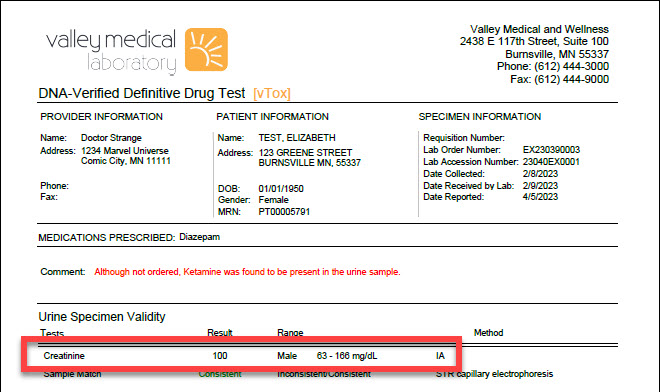Creatinine is a waste product that’s created when a person’s muscles are working. Low creatinine levels can be a sign of low muscle mass or related issues. It can also be an indicator of tampering with urine drug tests.
What is Creatinine?
Creatinine is a byproduct of normal muscle function. It’s typically filtered from the blood through a person’s kidneys and then excreted when they urinate. It is a reliable indicator of the body’s muscle mass and overall kidney function.
Medical professionals can test for creatinine via either blood or urine tests. Certain medical conditions can cause creatinine levels to rise or drop above or below normal levels.
What is a Typical Creatinine Level?
Note that creatinine levels in the blood—also called serum creatinine levels—work just the opposite as creatinine in the urine. That is, a high serum creatinine level translates into a low urine creatinine level, and vice versa. For the purposes of this article, we’ll focus on urine creatinine levels, as they more directly relate to urine drug testing.
There is no one set “typical” creatinine level, as urine creatinine levels vary depending on a person’s age, gender, and muscle mass. That said, the average urine creatinine level for males ranges from 63 to 166 milligrams per deciliter (mg/dL). The average urine creatinine level for females ranges from 56 to 161 mg/DL, lower with age.
What Can Cause High Urine Creatinine Levels?
Urine creatinine levels for a given patient may be higher than normal for the following reasons:
- Low muscle mass. This can be a function of age (muscle mass declines with age), malnutrition, or other issues.
- Certain chronic conditions, such as myasthenia gravis or muscular dystrophy, that affect muscle mass and creatinine levels.
- Extreme weight loss that also reduces muscle mass.
- Heavy or prolonged exercise.
- Dehydration.
Continuing high urine creatinine levels (above 166 for males and above 161 for females) may spur further testing for related muscle disorders.
What Can Cause Low Urine Creatinine Levels?
Low urine creatinine levels (below 63 for males and below 56 for females) can indicate that an individual’s kidneys are not functioning properly. That’s because if there is a kidney problem, creatinine can build up in the blood with less released into the individual’s urine.
Other possible causes of low urine creatinine levels include pregnancy, taking certain medications (such as diuretics), and drug and alcohol use. Attempts to dilute one’s urine can also result in low urine creatinine levels.
Why Do Low Creatinine Levels Matter for Urine Drug Testing?
Low urine creatinine levels can also be artificially induced by drinking extremely large amounts of water or adding water to the urine. This can be an issue if patients required to undergo urine drug testing try to “cheat” the system.
The situation arises when an individual tries to mask the presence of drugs in their system by consuming excessive amounts of water or other liquids before a urine test, or by adding water to their urine sample. While this can lower the concentration of drugs and other metabolites in the person’s urine, it can also decrease the amount of creatinine present.
For this reason, many toxicology testing labs routinely measure creatinine levels during standard urine drug testing. An abnormally low creatinine level is a sign of possible urine tampering, which could affect the test results for other substances.
Any individual required to take a urine drug test who exhibits low urine creatinine levels may be suspected of urine tampering. A person with low urine creatinine levels who hasn’t tried to dilute their urine should consult with their physician to check out other potential causes of low creatinine.
How Does Valley Medical Laboratory Consider Creatinine Levels When Performing Toxicology Testing?
Unlike many reference labs, Valley Medical Laboratory goes beyond just measuring creatinine levels during toxicology testing. Valley Medical takes the extra step to standardize all test results to the creatinine levels in the client’s urine.
By correlating creatinine levels with drug levels, Valley Medical’s testing can accurately determine if the urine sample has been diluted. This identifies any attempt by clients to artificially dilute their samples to mask drug use—and provides a more accurate assessment of substances present in the individual’s body.
Creatinine standardization is an added benefit of Valley Medical’s toxicology testing services. We also offer vTOX® DNA verification that eliminates the need for viewed urine collection. For these and other reasons, a growing number of treatment centers across the state of Minnesota rely on Valley Medical for fast, accurate, and easy to use toxicology testing.
To learn more about Valley Medical’s creatinine-standardized urine drug testing, contact us at 612-471-1141 or via email at info@valleymedlab.com. We’re looking forward to discussing how your facility can benefit from our vTOX® urine drug testing.


